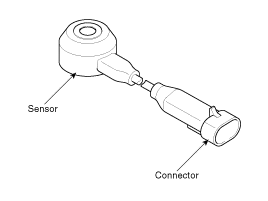Hyundai Genesis (DH): Engine Control System / Knock Sensor (KS) Description and Operation
Hyundai Genesis (DH) 2013-2016 Service Manual / Engine Control / Fuel System / Engine Control System / Knock Sensor (KS) Description and Operation
| Description |
Knocking is a phenomenon characterized by undesirable
vibration and noise and can cause engine damage. The two Knock Sensors
(KS) are installed inside the V-valley of the cylinder block and sense
engine knocking.
When knocking occurs, the vibration from the cylinder block is applied as pressure to the piezoelectric element.
When knocking occurs, the sensor produces voltage signal and
the ECM retards the ignition timing. If the knocking disappears after
retarding the ignition timing, the ECM will advance the ignition timing.
This sequential control can improve engine power, torque and fuel
economy.

Inspection 1. Check the signal waveform of the CMPS and CKPS using the GDS. Specification: Refer to
Specification ItemSpecificationCapacitance (pF)950 ~ 1,350Resistance (M?)4.87
Other information:
Hyundai Genesis (DH) 2013-2016 Service Manual: Components and Components Location
C
Hyundai Genesis (DH) 2013-2016 Service Manual: Blind Spot Detection Indicator Repair procedures
Removal Blind Spot Detection Warning Indicator 1. Disconnect the negative (-) battery terminal. 2. Remove the mirror (A). Installation Blind Spot Detection Warning Indicator 1. Install the outside mirror. 2. Connect the negative (-) battery terminal.
Categories
- Manuals Home
- Hyundai Genesis Owners Manual
- Hyundai Genesis Service Manual
- Emission Control System
- General Information
- Body (Interior and Exterior)
- New on site
- Most important about car
Copyright В© 2026 www.hgenesisdh.com - 0.0193
